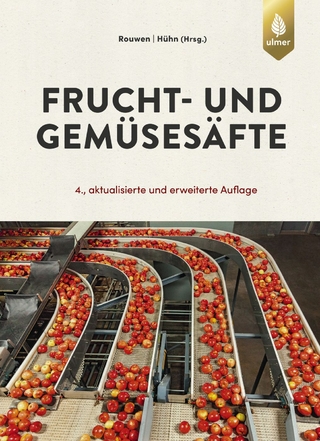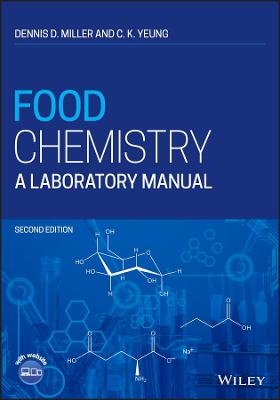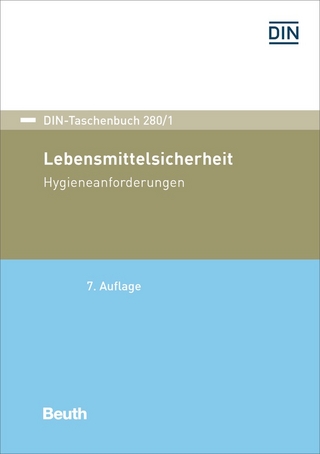
Trends in Fish Processing Technologies
Crc Press Inc (Verlag)
978-1-4987-2917-8 (ISBN)
The high market demand based on consumers’ trust in fish as a healthy and nutritious food resource made fish processing a very dynamic industry, spurring many innovations in processing and packaging methods. Trends in Fish Processing Technologies not only reflects what is currently new in fish processing but also points out where things are heading in this area. This book provides an overview of the modern technologies employed by the industry.
It details the advances in fish processing, including high pressure processing (HPP), pulsed electric field (PEF) treatment and minimally heat processing combined with microwave (MW) and radio-frequency (RF). It provides references to food safety management systems and food safety & quality indicators for processed fish in order to achieve an adequate level of protection. Quality aspects and molecular methods for the assessment of fish and fish products integrity are introduced. Fish products reformulation trends based on sustainability principles that tackles the reduction of salt content and the use of natural antimicrobials are presented. Innovative packaging solutions for fish products are explored, detailing intelligent packaging with freshness and time-temperature indicators, applications of modified packaging atmosphere, antimicrobial bio-nanocomposite packaging materials and biodegradable edible films used as primary fish packaging. In addition to covering the current advancements in fish processing the book discusses fraud, adulteration, fair trade practices, traceability and the need for added value, clean and sustainable processing in the fish chain.
Daniela Borda graduated in 1993 from the Faculty of Food Technology; in 1999, she obtained an MSc degree and, in 2005, acquired a PhD degree in Industrial Engineering at the “Dunarea de Jos” University of Galati, Romania (UGAL). She is currently a professor at UGAL, giving lectures in Food Quality and Safety, Dairy Technology, for bachelor and master students. Her main research interests are related with high-pressure processing, dairy science, gas-chromatography, and edible coat-ings and films.She was an internal and external examiner for several PhD theses. Daniela Borda has served as a reviewer for the Journal of Dairy Science (ADSA), Journal of Food Processing and Preservation ( Wiley), Food Chemistry (Elsevier), Food and Chemical Toxicology (Elsevier), and other scientific publications. As food safety expert, Daniela Borda is involved in third-party audits with the Romanian National Accreditation Body–RENAR. Daniela Borda is the director of Romanian Academica Publishing House, with more than 100 scientific books published and over 50 titles in food science. Two of the books coauthored by Daniela Borda and published by Academica Publishing House have received national awards from the “Gh. Ionescu-Şişeşti” Academy of Agricultural and Forestry Sciences in Romania. Anca Ioana Nicolau graduated as food technologist (1985) and obtained her PhD title in Biotehnology (1999) at the “Dunarea de Jos” University of Galati, Romania. She is currently professor of Food Microbiology, Rapid Methods, and Automation in Microbiology and Hygiene for Food Business Operators at the same institution where she studied and is qualified to coordinate PhD thesis in the domain of indus-trial engineering, specialization food industry. Her current research is related to the detection of pathogens in food and food processing environments and to the destruction of microorganisms using alternative technologies. She is member of the technological platform Food for Life Romania, where she acts as member of the operational committee andvice president of the working group Quality, Processing and Food Safety. A.I. Nicolau serves as evaluator for European projectsandreviewer for several ISI journals (e.g., Frontiers in Microbiology, Food Microbiology, Foods, and Journal of Food Science). She has authored a couple of books in Romanian and many chapters in books edited either in Romanian or in English (Woodhead Publishing, Humana Press, and Springer). She received two academia awards for contributions to technical books in the domain of food industry and food safety: one from the “Gh. Ionescu-Şişeşti” Academy of Agricultural and Forestry Sciences in Romania and the other one from the Romanian Academy. Peter Raspor is doctor of biotechnological sciences and a professor of industrial microbiology and biotechnology, teaching and researching in Slovenia and Austria. He started as a baker, and later, he finished his education in biochemical engineering with a degree in food science and later activated in biotechnology field. He started the first study program in biotechnology in Slovenia at Ljubljana University and run it from 1994 to 2002, became chair of biotechnology, microbiology, and food safety where he activated until 2013. From 2014 to 2016 he worked at the University of Ljubljana and Institute for Food Nutrition and Health at University of Primorska, where he was member of the managerial team. Under his mentorship, more than 200 students have finished studies in the area of food technology, biotechnology, and microbiology with diploma and 47 at doctoral level. He was the head of the programs of microbiology and biotechnology at University of Ljubljana, Institute for food and health at University of Primorska, and vice dean for research and international coop-eration at the Faculty of Health Sciences. He conducted more than two dozen inter-national and national projects in the last 20 years. From 1995 until 2014, he was active with European Cooperation in Science and Technology (COST) and within top commissions of the European Union. He was president of European Federation of Food Science & Technology (EFFoST) from 2007 to 2010 and secretary general of Federation of European Microbiological Societies (FEMS) from 2000 to 2006. He is also involved with other international and national governmental and nongovern-mental organizations in Europe. He contributed to European and Global policy doc-uments and declarations in food and microbiology areas. He is a member of many scientific and professional societies and a member of editorial boards or is an editor of highly respected journals in the field. His professional profile is highly respected in the area of food technology and nutrition, industrial microbiology, and biotech-nology. He has been awarded with many highest national and international awards. Professionally, he has also been involved as an auditor for ISO 9000 standards and ISO 22000 in terms of HACCP and food safety management issues for more than 20 years in the food and pharmaceutical sector. In the last few years, he has also con-ducted and chaired a few commissions performing international auditing of quality management systems at prestigious universities on pedagogical and research levels. Prof. Da-Wen Sun, born in southern China, is a global authority in food engineering research and education; he is a member of the Royal Irish Academy (RIA), which is the highest academic honor in Ireland; he is also a member of Academia Europaea (The Academy of Europe), a fellow of the International Academy of Food Science and Technology, and a Fellow of International Academy of Agricultural and Biosystems Engineering. He is also the founder and editor-in-chief of Food and Bioprocess Technology, one of the most prestigious food science and technology journals; series editor of the Contemporary Food Engineering book series, with already about 50 volumes published; and the founder and president of the International Academy of Agricultural and Biosystems Engineering (iAABE). In addition, he served as the president of the International Commission of Agricultural and Biosystems Engineering (CIGR), the world’s largest organization in the field, in 2013–2014, and is now honorary president of CIGR. He has significantly contributed to the field of food engineering as a researcher, as an academic authority, and as an educator.His main research activities include cooling, drying, and refrigeration processes and systems, quality and safety of food products, bioprocess simulation and opti-mization, and computer vision/image processing and hyperspectral imaging tech-nologies. His many scholarly works have become standard reference materials for researchers, especially in the areas of computer vision, computational fluid dynam-ics modeling, vacuum cooling, and related subjects. Results of his work have been published in over 800 papers, including more than 400 peer-reviewed journal-papers (Web of Science h-index = 79, SCOPUS h-index = 83), among them, 33 papers have been selected by Thomson Reuters’s Essential Science Indicators as highly cited papers, ranking him no. 2 in the world in Agricultural Sciences (January 2017). He has also edited 15 authoritative books. According to ESI, based on data derived over a period of 10 years from Web of Science, there are about 4500 scientists who are among the top one percent of the most cited scientists in the category of Agriculture Sciences, and in the last few years, Professor Sun has consistently been ranked among the very top 10 scientists in the world (he was at the 9th position in January 2017) and has been named Highly Cited Researcher in 2015 and 2016 by Thomson Reuters.He received a first class BSc honors and MSc in mechanical engineering, and a PhD in chemical engineering in China before working in various universities in Europe. He became the first Chinese national to be permanently employed in an Irish university when he was appointed college lecturer at the National University of Ireland, Dublin (University College Dublin, UCD), in 1995, and was then progres-sively promoted in the shortest possible time to senior lecturer, associate professor, and full professor. Dr. Sun is now a professor of food and biosystems engineering and the director of the UCD Food Refrigeration and Computerized Food Technology Research Group. As a leading educator in food engineering, Professor Sun has trained many PhD students, who have made their own contributions to the industry and academia. He has also frequently delivered lectures on advances in food engineering at academic institutions worldwide, and delivered keynote speeches at international conferences. As a recognized authority in food engineering, he has been conferred adjunct/visiting/consulting professorships from 10 top universities in China, including Zhejiang University, Shanghai Jiaotong University, Harbin Institute of Technology, China Agricultural University, South China University of Technology, and Jiangnan University. In recognition of his significant contribution to food engineering worldwide and for his outstanding leadership in the field, the International Commission of Agricultural and Biosystems Engineering (CIGR) awarded him the “CIGR Merit Award” in 2000, and again in 2006, the Institution of Mechanical Engineers based in the United Kingdom named him “Food Engineer of the Year 2004.” In 2008, he was awarded the “CIGR Recognition Award” in honor of his distinguished achieve-ments as one of the top 1% among agricultural engineering scientists in the world. In 2007, he was presented with the only “AFST(I) Fellow Award” given in that year by the Association of Food Scientists and Technologists (India), and in 2010, he was presented with the “CIGR Fellow Award”; the title of Fellow is the highest honor at CIGR and is conferred to individuals who have made sustained, outstanding contri-butions worldwide. In March 2013, he was presented with the “You Bring Charm to the World” Award by Hong Kong-based Phoenix Satellite Television with other award recipients including the 2012 Nobel Laureate in Literature and the Chinese Astronaut Team for Shenzhou IX Spaceship. In July 2013, he received the “Frozen Food Foundation Freezing Research Award” from the International Association for Food Protection (IAFP) for his significant contributions to enhancing the field of food-freezing technologies. This is the first time that this prestigious award was presented to a scientist outside the United States, and in June 2015, he was presented with the “IAEF Lifetime Achievement Award.” This IAEF (International Association of Engineering and Food) award highlights the lifetime contribution of a prominent engineer in the field of food.
Series Preface
Preface
Series Editor
Editors
Contributors
Introduction
Chapter 1 Recent Advances in Seafood Technology: An Overview
Chapter 2 Minimal Heat Processing Applied in Fish Processing
Chapter 3 High-Pressure Processing of Seafood
Chapter 4 Processing of Low-Value Fish, Coproducts, and By-Catch
Chapter 5 Advances in Surimi Processing
Chapter 6 Reformulation of Preserved Fish Products
Chapter 7 New Product Development
Chapter 8 Clean Fish Processing Technologies
Chapter 9 Innovative Fish Packaging Solutions
Chapter 10 Achieving Adequate Protection and Suitable Food Safety Indicators
Chapter 11 Food Safety Management in Fish Processing Units
Chapter 12 Quality and Quality Changes Assessment of Processed Fish
Chapter 13 Molecular Methods for Assessment of Fish and Fish Product Integrity
Chapter 14 Adulteration and Misbranding of Fish Products
Chapter 15 Traceability of Fish Products
Chapter 16 Fish Trade Regulations
Index
| Erscheinungsdatum | 31.01.2018 |
|---|---|
| Reihe/Serie | Contemporary Food Engineering |
| Zusatzinfo | 21 Tables, black and white; 19 Line drawings, black and white; 4 Halftones, black and white; 23 Illustrations, black and white |
| Verlagsort | Bosa Roca |
| Sprache | englisch |
| Maße | 156 x 234 mm |
| Gewicht | 630 g |
| Themenwelt | Technik ► Lebensmitteltechnologie |
| Weitere Fachgebiete ► Land- / Forstwirtschaft / Fischerei | |
| ISBN-10 | 1-4987-2917-7 / 1498729177 |
| ISBN-13 | 978-1-4987-2917-8 / 9781498729178 |
| Zustand | Neuware |
| Haben Sie eine Frage zum Produkt? |
aus dem Bereich


